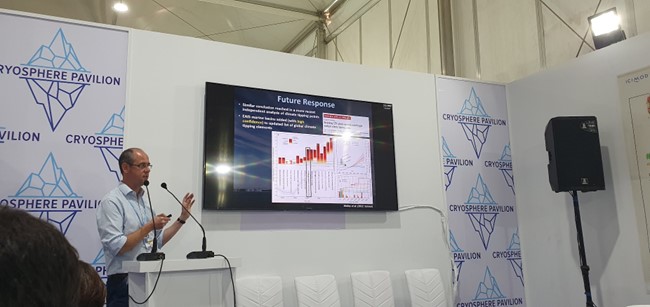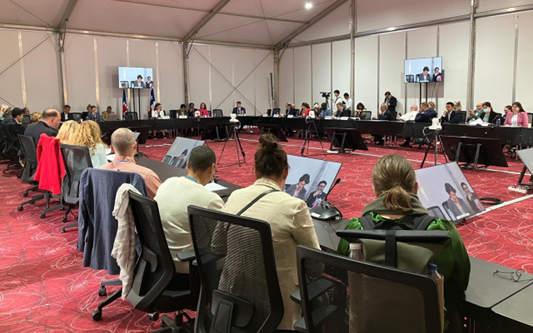Reflections on COP27
Professor Chris Stokes is a glaciologist in our Department of Geography. His research focusses on the response of glaciers to climate change and ranges from monitoring small mountain glaciers over the last few decades to large-scale reconstructions of continental ice sheets over tens of thousands of years.
Visit our COP28 webpage for more information on our delegates.
How did it feel to be part of such a significant event as COP27?
It was a huge privilege to be able to attend COP27 as one of the small number of delegates from Durham University. It was exciting to be able to present and discuss some of the results of our research on Antarctica to policy-makers and non-governmental organisations and agencies. It was also fascinating to have the opportunity to attend some of the negotiations amongst the parties and meet people from all over the world.
It’s a huge privilege to be involved in such a rapidly-moving field that is of both scientific and societal importance.
Can you give us an idea of the kinds of things you were involved in at the conference?
I was involved in several scheduled activities in what is called the Blue Zone, a UN-managed space where negotiations are hosted and where many UN agencies, countries and regions are represented in over 150 ‘Pavilions’ which run ‘Side Events’ that include talks, exhibitions, workshops and panel discussions.
I was mostly involved with exhibitions and talks in the ‘Cryosphere Pavilion’, which is organised by the International Climate Cryosphere Initiative (ICCI). The ICCI are a network of senior policy experts and researchers working with governments and organizations to create, shape and implement initiatives designed to preserve as much of the Earth’s cryosphere as possible. I organised a Side Event where I presented some of our recent work showing the importance of satisfying the Paris Climate Agreement to protect the world’s largest ice sheet in East Antarctica; and thus avoid several metres of additional sea level rise over the next few centuries. I also spoke at other events in the Cryosphere Pavilion and the ‘Science for Climate Action Pavilion’, which was co-sponsored by the World Meteorological Organization (WMO), the Intergovernmental Panel on Climate Change (IPCC) and the MERI Foundation.

A key outcome from a cryosphere perspective was that, during COP27, twenty countries came together to form the ‘Ambition on Melting Ice (AMI)’ coalition, which aims to raise awareness that global emissions must be reduced on a much more rapid timeline, to limit cryosphere loss and its permanent consequences. It was fantastic to see this come together and be there in the room to see the signing of the declaration by these countries. Another major milestone was the COP27 cover decision’s direct reference to the need for better understanding of the impacts of climate change on the cryosphere, which was (I think) the first time that the word ‘cryosphere’ appeared in the cover text.
Colleagues from Durham University, led by Professor Petra Minnerop from Durham Law School, also organised a Side Event in the Climate Education Hub Pavilion, where we were able to introduce some of the interdisciplinary activities in our new Centre for Sustainable Development Law and Policy (CSDLP).
What is one of the most important things you learnt at the conference?
Firstly, and from a cryosphere perspective, it is very clear that there is now a real urgency to try and meet the Paris Climate Agreement to limit global warming to well below 2, preferably 1.5 degrees Celsius, compared to pre-industrial levels. We are currently at around 1.1 degrees Celsius of warming and, unfortunately, we are already committed to the loss of some mountain glaciers and further sea level rise over the coming decades. As the headline of the ICCI’s recent ‘State of the Cryosphere Report’ noted: “We can’t negotiate with the melting point of ice”.
However, the science is now very clear that we can avert the worst consequences if we can limit the warning to 1.5 degrees Celsius. I sensed that there is a genuine recognition of the importance of meeting the Paris Agreement at COP27, but whether we can move quickly enough is another matter.

On a more personal level, I learnt that the formal presentations and exhibitions are important, but perhaps not as important as the meetings and discussions that take place, often by chance, which provide great opportunities to share the science and connect with people from all over the world, including some alumni from our Geography Department, which was a pleasant surprise.
What makes you so passionate about climate change?
It’s a huge privilege to be involved in such a rapidly-moving field that is of both scientific and societal importance. I sense a real frustration amongst younger generations that not enough is being done and, to a large extent, I agree. However, I also have to remind myself that we’ve come a very long way in the 20 years or so that I’ve been working in this field. There has been a very clear shift from denial to acceptance and, more recently, to genuine action and commitments. It may not be happening quickly enough, and there are many challenges ahead, but things are happening.
More personally, I’m passionate about climate change because it is an issue with deep injustices. Some of the countries and populations that are most affected are least to blame for the climate crisis. I feel strongly that some of these inequalities should be addressed and that solutions are becoming available and affordable, both in terms of mitigation and adaptation.
What do you think is the most important thing people can do to make positive steps towards tackling climate change?
The quick answer is easy to say but hard to implement: use less energy. There are multiple ways we might consume less energy (from heating our homes to changing our mode and frequency of travel), but this isn’t easy for most of us who have become accustomed to a lifestyle of convenience and consumption that would have been unimaginable just one or two generations ago. I guess the good news is that some of the sacrifices we might wish to make will save us money, such as taking holidays closer to home or turning the thermostat down.
Find out more
We are a world-leading centre of geographic education, ranked joint 14th in the QS World University Rankings by Subject 2023.
Our success as a department is a measure of the open, inclusive environment we foster for students. To be a member of Durham Geography is to be welcomed by a community that wants you to succeed and creates an environment to make it happen.
Read more of our COP27 blogs:
